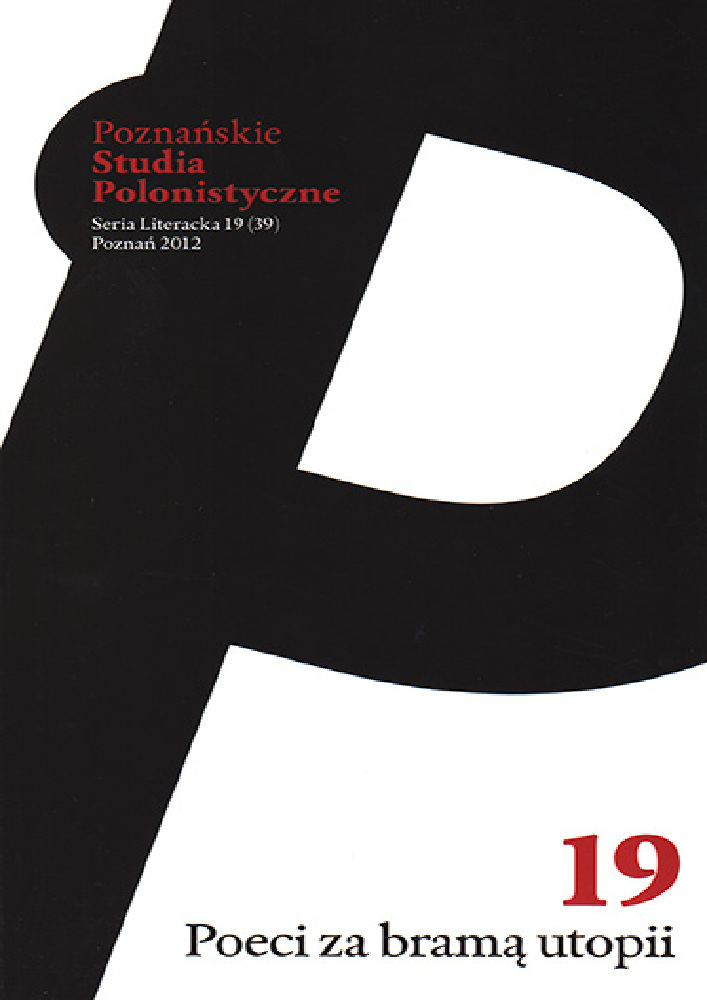Abstrakt
This article is a critical review of the most important modern interpretations of the Platonic postulate of expelling poets from the polis, formulated in two works of the thinker, the Republic and the Laws. The reflections presented in the article focus on two fundamental questions, namely the reasons behind Plato’s refusal to allow poets into his ideal state and, secondly, the aim he was going to attain by expelling artists from the community of citizens. To try to explain the reasons behind these statements, so embarrassing to present-day readers of Plato, involves considerations of Plato’s concept of the nature of poetry (art as flawed, defective and secondary reflection of the sensual world), as well as of ethical questions (art as a perfidious tool to facilitate malevolent designs towards human characters). Any investigation as to the intentions of the philosophers that preceded the formulation of the postulate concentrates thus inevitably on his vision of utopian realism. It further aims to provide sufficient arguments that Plato, oscillating in his presentation between authoritarian diagnosis and protreptic provocation, makes recipients redefine the mutual relationship between literature and philosophy.Bibliografia
Adam J., The Republic of Plato, ed. J. Adam (first ed. 1902), second ed. D.A. Rees, Cambridge 1963.
Annas J., An Introduction to Plato’s Republic, Oxford 1981.
Antologia Palatyńska, przeł. Z. Kubiak, Warszawa 1992.
Burnyeat M.F., Utopia and Fantasy: The Practicability of Plato’ Ideally Just City, w: Plato, ed. G. Fine, Oxford 2000.
Dembińska D., Platon o wychowaniu, „Meander” 1984, nr 37.
Dramatyzacja Apologii Sokratesa, w: Starożytny dramat. Teoria, praktyka, recepcja, red. K. Narecki, Lublin 2011.
Else G.F., Plato and Aristotle on Poetry, ed. P. Burian, Chapel Hill–London 1986.
Ford A., The Origins of Criticism. Literary Culture and Poetic Theory in Classical Greece, Princeton–Oxford 2002.
Gawroński A., Dlaczego Platon wykluczył poetów z Państwa? U źródeł współczesnych badań nad językiem, Warszawa 1984.
Gentile B., Poetry and Its Public in Ancient Greece. From Homer to the Fifth Century, przeł. A.Th. Cole, Baltimore–London 1988.
Giuliano F.M., Platone e la poesia. Teoria della composizione e prassi della ricezione, Sankt Augustin 2005.
Gonzales J., The Hermeneutics of Madness: Poet and Philosopher in Plato’s Ion and Phaedrus, w: Plato and the Poets, ed. P. Destrée, F.-G. Herrmann, Leiden 2011.
Halliwell S., Antidotes and Incantations: Is there a cure for poety In Plato’s Republic?, w: Plato and the Poets, ed. P. Destrée, F.-G. Herrmann, Leiden 2011.
Havelock E.A., Preface to Plato, Oxford 1963.
Havelock E.A., Przedmowa do Platona, przeł. P. Majewski, Warszawa 2007.
Keats J., Rozplatanie tęczy. Nauka, złudzenia i apetyt na cuda, przeł. M. Betley, Warszawa 2001.
Keats J., Unweaving the Rainbow. Science, Delusion and the Appetite for Wander, Boston 1998.
Kenner H., Plato and Those Poets, „The New York Times” Nov. 20, 1977 (www.nytimes.com/books/98/12/20/specials/ murdoch-firesun.html), dostęp: 30 VI 2011.
Koning H.H., Hesiod: The Other Poet. Ancient Reception of Cultural Icon, Leiden 2010.
Lear J., Inside and Outside. The Republic, „Phronesis” 1992, nr 37.
Lengauer W., O poezji u starożytnych, „Literatura na Świecie” 1996, nr 8–9.
Liryka starożytnej Grecji, przeł. W. Appl, oprac. J. Danielewicz, Warszawa–Poznań 1996.
Most G.W., What Ancient Quarrel Between Philosophy and Poetry? w: Plato and the Poets, ed. P. Destrée, F.-G. Herrmann, Leiden 2011.
Murdoch I., The Fire and The Sun. Why Plato Banished the Artists?, London 1977.
Murray P., Plato on Poetry, Cambridge 1996.
Naddaff R.A., Exiling the Poets. The Production of Censorship in Plato’s Republic, Chicago–London 2002.
Nussbaum M., The Fragility of Goodness. Luck and Ethics in Greek Tragedy and Philosophy, Cambridge 1986.
Olson D.S., Broken Laughter. Select Fragments of Greek Comedy, Oxford 2007.
Platon. Prawa, przeł. M. Mykowska, Warszawa 1960.
Podbielski M., Problemy interpretacji tekstów Platona, w: Literatura Grecji starożytnej, red. H. Podbielskiego, t. 2, Lublin 2005.
Poetry as Flawed Reproduction: Possesion and Mimesis, w: Plato and the Poets, ed. P. Destrée, F.-G. Herrmann, Leiden 2011.
Reeve D.C., Philosopher-Kings. The Argument of Plato’s Republic, Princeton 1988.
Rosen S., Plato’s Republic. A Study, New Haven–London 2005.
Russell D.A., Criticism in Antiquity, London 1981.
Rutherford R.B., The Art of Plato. Ten Essays in Platonic Interpretation, London 1995.
Schofield M., Plato’s Political Philosophy, Oxford 2006.
Verdenius W.J., Mimesis. Plato’s Doctrine of Artistic Imitation and its Meaning to us, Leiden 1949.
Vicaire P., Platon, critique littéraire, Paris 1960.
Wesoły M., Mimesis dramatyczna według Platona i Arystotelesa, „Eos” 1996, nr 84.
Witwicki W., Platona Państwo, t. 2, Warszawa 1992.
Zygmuntowicz D., Praktyka polityczna. Od Państwa do Praw Platona, Toruń 2011.
Licencja
Autorzy
Autorzy tekstów przyjętych do publikacji w czasopiśmie „Poznańskie Studia Polonistyczne. Seria Literacka” są zobowiązani do wypełnienia, podpisania i odesłania na adres redakcji umowy o udzielenie nieodpłatnej licencji do utworów, z zobowiązaniem do udzielania sublicencji CC.
Zgodnie z umową, autorzy tekstów opublikowanych w czasopiśmie „Poznańskie Studia Polonistyczne. Seria Literacka” udzielają Uniwersytetowi im. Adama Mickiewicza w Poznaniu niewyłącznej i nieodpłatnej licencji oraz zezwalają na użycie sublicencji Creative Commons Attribution-NoDerivatives 4.0 International (CC BY-ND 4.0).
Autorzy zachowują prawa do dalszego, swobodnego rozporządzania utworem.
Użytkownicy
Zainteresowani użytkownicy internetu uprawnieni są do korzystania z utworów opublikowanych od 2016 roku w „Poznańskich Studiach Polonistycznych. Serii Literackiej” pod następującymi warunkami:
- uznanie autorstwa – obowiązek podania wraz z rozpowszechnionym utworem, informacji, o autorstwie, tytule, źródle (odnośniki do oryginalnego utworu, DOI) oraz samej licencji;
- bez tworzenia utworów zależnych – utwór musi być zachowany w oryginalnej postaci, nie można bez zgody twórcy rozpowszechniać np. tłumaczeń, opracowań.
Do wszystkich tekstów opublikowanych przed 2016 r. prawa autorskie są zastrzeżone.
Inne
Uniwersytet im. Adama Mickiewicza w Poznaniu zachowuje prawo do czasopisma jako całości (układ, forma graficzna, tytuł, projekt okładki, logo itp.).
